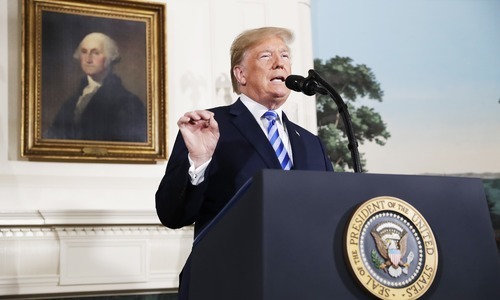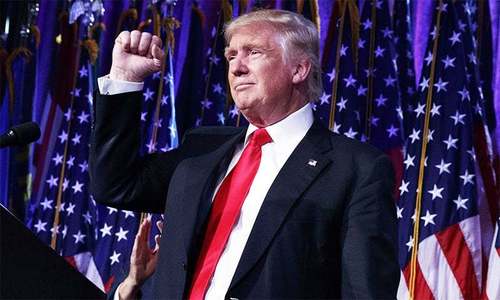TEHRAN: Iran finds itself in a tricky balancing act as it weighs a response to US President Donald Trump’s decision to pull out of the nuclear deal.
“They need to find a response that keeps the Europeans on their side but also shows they can’t just be pushed around,” said a Western diplomat in Tehran. “That seems pretty difficult.”
For now, President Hassan Rouhani has said he will hold talks with the other parties to the 2015 agreement — Britain, France, Germany, China and Russia.
He has said there will only be a “short period” in which to assess whether Iran’s interests can still be preserved in concert with the remaining parties.
Read: US exit shifts initiative to European powers
Some analysts say Iran could retaliate by causing trouble for US interests across the Middle East, where Tehran has widespread influence and large proxy forces.
“Iran will push back, to show that it cannot be bullied,” said Mark Fitzpatrick of the International Institute for Strategic Studies.
“Iran’s main response... will probably be asymmetrical, harming US interests in other realms, such as Syria and Iraq. While it may not be immediate, a push-back is inevitable,” he said in a briefing note.
For now, Iranian officials have suggested there are three broad responses.
Resume high-level enrichment
Speaking immediately after Trump’s announcement, Rouhani said he had instructed the Iranian Atomic Energy Organisation “to take the necessary measures for future actions so that if necessary we can resume industrial enrichment without limit”.
The head of the organisation, Ali Akbar Salehi, has said in recent months that Iran is ready to resume high-level uranium enrichment to 20 percent “within five days”.
“We will wait several weeks before applying this decision. We will speak with our friends and allies, the other members of the nuclear agreement,” Rouhani said on Tuesday.
The deal restricted Iran to enrichment to around 3.5 percent, the level needed for nuclear power stations.
Although 20 percent is still within civilian use limits, the move would mean Iran was building up a stock that could then be enriched to military-grade levels of 80 percent or more.
President Rouhani said on Monday that Iran would stay in the agreement even if the United States pulled out.
But he wants assurances that Iran’s interests — primarily trade benefits from the deal — will be preserved.
“Either what we want from the nuclear deal is guaranteed by the non-American parties, or it is not the case and we will follow our own path,” he said in a statement.
Europe has been adamant that it wants to preserve the accord, but Washington has already threatened that European businesses in Iran must be wound down within six months.
Parliament speaker Ali Larijani said that Europe had caved to US pressure before, having seen many of its businesses shut up shop under previous international sanctions from 2012-15.
“We can’t put much confidence in their statements about preserving the agreement, but it’s worth testing for a few weeks so that it’s clear to the world that Iran has tried all the avenues to a peaceful political resolution,” Larijani told parliament on Wednesday.
Look East
Russia and China are less exposed to US markets and therefore better placed to resist Washington’s economic pressure.
Supreme leader Ayatollah Ali Khamenei said recently that a top priority in Iran’s foreign policy today was “preferring East to West”.
That reflects Iran’s strengthening of relations with Russia, an ally in the Syrian conflict, and with China, which has no qualms about its business ties to Iran.
Ayatollah Khamenei has also warned in the past that Iran would burn the nuclear deal if the US walked out.
But while he has ultimate authority in Iran, any decision will emerge from discussions between officials from across the political spectrum.
Published in Dawn, May 10th, 2018













































